University Assignment: Critical Reflection on Indigenous Health
VerifiedAdded on 2022/09/21
|6
|1626
|21
Report
AI Summary
This report presents a critical reflection on Indigenous health and cultural safety, addressing key concepts such as cultural safety, worldview, and the impact of social determinants on Aboriginal and Torres Strait Islander peoples' health. The report explores the importance of establishing positive relationships, ensuring cultural competence, and promoting culturally safe care within healthcare settings. It examines the historical context, including the impact of colonization and the Treaty of Waitangi, and discusses strategies for decolonization in healthcare practices. The reflection incorporates personal experiences and observations, highlighting the challenges and disparities faced by Indigenous Australians in healthcare and emphasizing the need for healthcare professionals to be aware of existing primary healthcare programs and community-controlled initiatives. The report concludes with a commitment to applying the acquired knowledge to provide respectful, holistic, and culturally appropriate care to Indigenous patients.
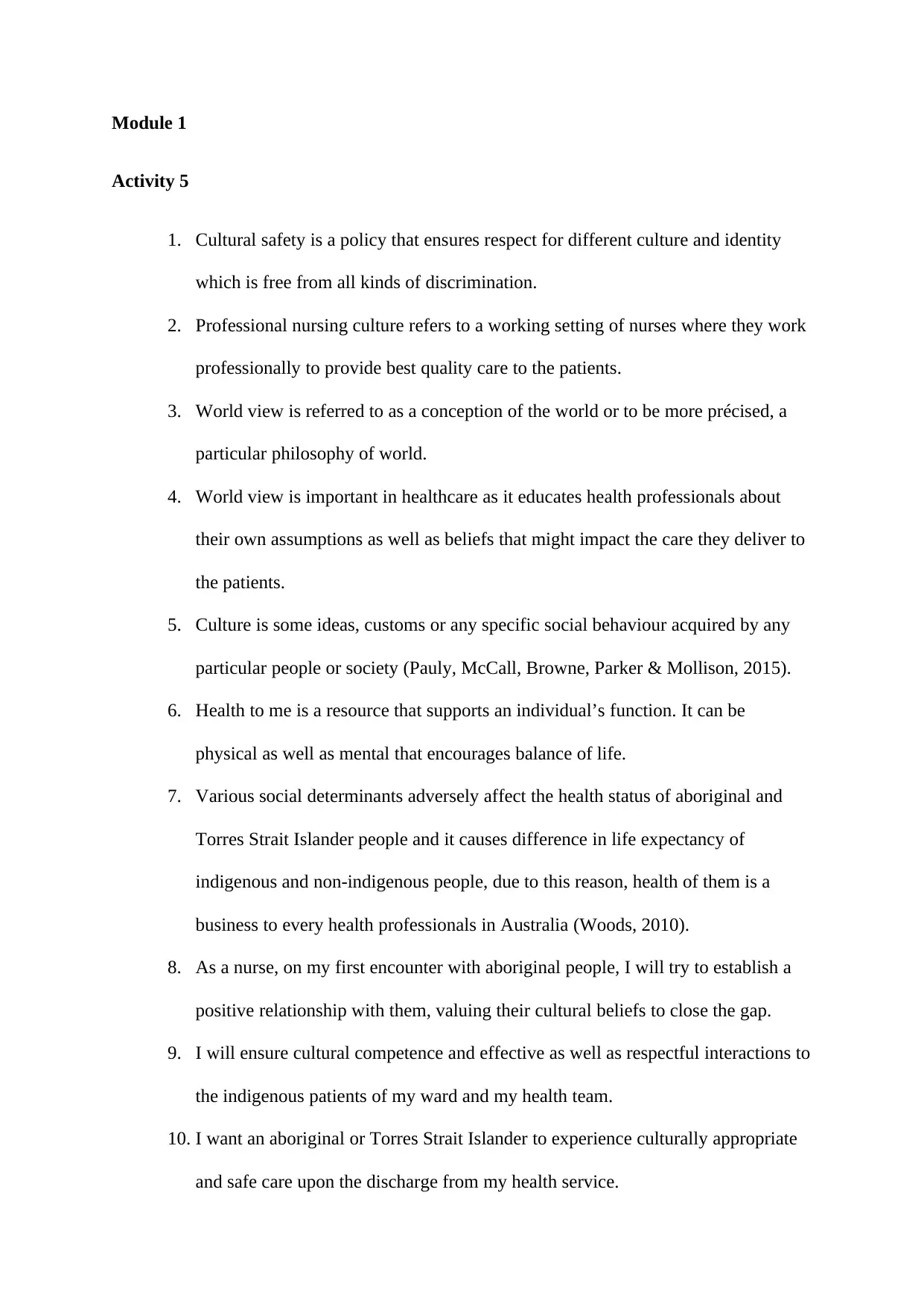
Module 1
Activity 5
1. Cultural safety is a policy that ensures respect for different culture and identity
which is free from all kinds of discrimination.
2. Professional nursing culture refers to a working setting of nurses where they work
professionally to provide best quality care to the patients.
3. World view is referred to as a conception of the world or to be more précised, a
particular philosophy of world.
4. World view is important in healthcare as it educates health professionals about
their own assumptions as well as beliefs that might impact the care they deliver to
the patients.
5. Culture is some ideas, customs or any specific social behaviour acquired by any
particular people or society (Pauly, McCall, Browne, Parker & Mollison, 2015).
6. Health to me is a resource that supports an individual’s function. It can be
physical as well as mental that encourages balance of life.
7. Various social determinants adversely affect the health status of aboriginal and
Torres Strait Islander people and it causes difference in life expectancy of
indigenous and non-indigenous people, due to this reason, health of them is a
business to every health professionals in Australia (Woods, 2010).
8. As a nurse, on my first encounter with aboriginal people, I will try to establish a
positive relationship with them, valuing their cultural beliefs to close the gap.
9. I will ensure cultural competence and effective as well as respectful interactions to
the indigenous patients of my ward and my health team.
10. I want an aboriginal or Torres Strait Islander to experience culturally appropriate
and safe care upon the discharge from my health service.
Activity 5
1. Cultural safety is a policy that ensures respect for different culture and identity
which is free from all kinds of discrimination.
2. Professional nursing culture refers to a working setting of nurses where they work
professionally to provide best quality care to the patients.
3. World view is referred to as a conception of the world or to be more précised, a
particular philosophy of world.
4. World view is important in healthcare as it educates health professionals about
their own assumptions as well as beliefs that might impact the care they deliver to
the patients.
5. Culture is some ideas, customs or any specific social behaviour acquired by any
particular people or society (Pauly, McCall, Browne, Parker & Mollison, 2015).
6. Health to me is a resource that supports an individual’s function. It can be
physical as well as mental that encourages balance of life.
7. Various social determinants adversely affect the health status of aboriginal and
Torres Strait Islander people and it causes difference in life expectancy of
indigenous and non-indigenous people, due to this reason, health of them is a
business to every health professionals in Australia (Woods, 2010).
8. As a nurse, on my first encounter with aboriginal people, I will try to establish a
positive relationship with them, valuing their cultural beliefs to close the gap.
9. I will ensure cultural competence and effective as well as respectful interactions to
the indigenous patients of my ward and my health team.
10. I want an aboriginal or Torres Strait Islander to experience culturally appropriate
and safe care upon the discharge from my health service.
Paraphrase This Document
Need a fresh take? Get an instant paraphrase of this document with our AI Paraphraser
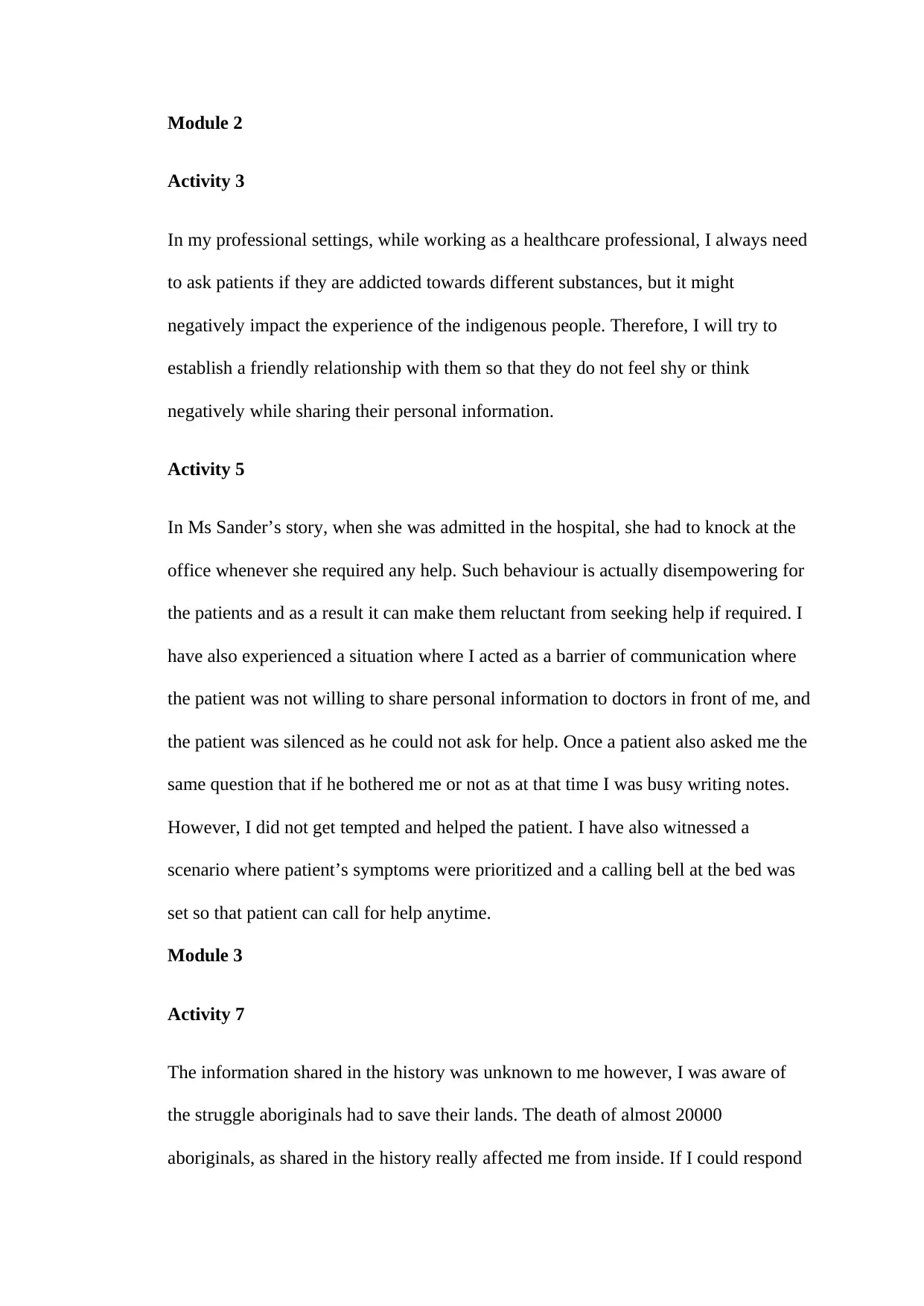
Module 2
Activity 3
In my professional settings, while working as a healthcare professional, I always need
to ask patients if they are addicted towards different substances, but it might
negatively impact the experience of the indigenous people. Therefore, I will try to
establish a friendly relationship with them so that they do not feel shy or think
negatively while sharing their personal information.
Activity 5
In Ms Sander’s story, when she was admitted in the hospital, she had to knock at the
office whenever she required any help. Such behaviour is actually disempowering for
the patients and as a result it can make them reluctant from seeking help if required. I
have also experienced a situation where I acted as a barrier of communication where
the patient was not willing to share personal information to doctors in front of me, and
the patient was silenced as he could not ask for help. Once a patient also asked me the
same question that if he bothered me or not as at that time I was busy writing notes.
However, I did not get tempted and helped the patient. I have also witnessed a
scenario where patient’s symptoms were prioritized and a calling bell at the bed was
set so that patient can call for help anytime.
Module 3
Activity 7
The information shared in the history was unknown to me however, I was aware of
the struggle aboriginals had to save their lands. The death of almost 20000
aboriginals, as shared in the history really affected me from inside. If I could respond
Activity 3
In my professional settings, while working as a healthcare professional, I always need
to ask patients if they are addicted towards different substances, but it might
negatively impact the experience of the indigenous people. Therefore, I will try to
establish a friendly relationship with them so that they do not feel shy or think
negatively while sharing their personal information.
Activity 5
In Ms Sander’s story, when she was admitted in the hospital, she had to knock at the
office whenever she required any help. Such behaviour is actually disempowering for
the patients and as a result it can make them reluctant from seeking help if required. I
have also experienced a situation where I acted as a barrier of communication where
the patient was not willing to share personal information to doctors in front of me, and
the patient was silenced as he could not ask for help. Once a patient also asked me the
same question that if he bothered me or not as at that time I was busy writing notes.
However, I did not get tempted and helped the patient. I have also witnessed a
scenario where patient’s symptoms were prioritized and a calling bell at the bed was
set so that patient can call for help anytime.
Module 3
Activity 7
The information shared in the history was unknown to me however, I was aware of
the struggle aboriginals had to save their lands. The death of almost 20000
aboriginals, as shared in the history really affected me from inside. If I could respond
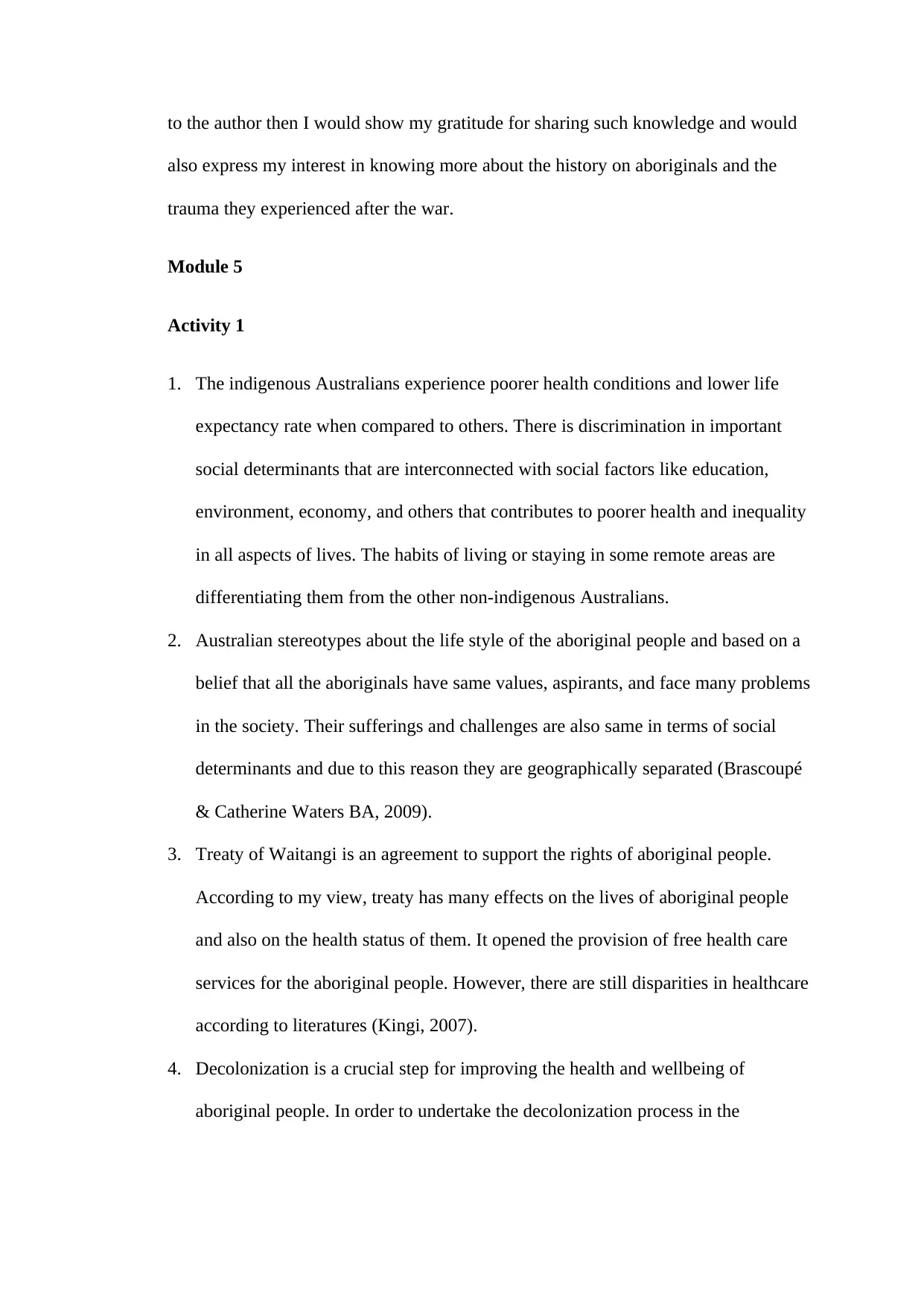
to the author then I would show my gratitude for sharing such knowledge and would
also express my interest in knowing more about the history on aboriginals and the
trauma they experienced after the war.
Module 5
Activity 1
1. The indigenous Australians experience poorer health conditions and lower life
expectancy rate when compared to others. There is discrimination in important
social determinants that are interconnected with social factors like education,
environment, economy, and others that contributes to poorer health and inequality
in all aspects of lives. The habits of living or staying in some remote areas are
differentiating them from the other non-indigenous Australians.
2. Australian stereotypes about the life style of the aboriginal people and based on a
belief that all the aboriginals have same values, aspirants, and face many problems
in the society. Their sufferings and challenges are also same in terms of social
determinants and due to this reason they are geographically separated (Brascoupé
& Catherine Waters BA, 2009).
3. Treaty of Waitangi is an agreement to support the rights of aboriginal people.
According to my view, treaty has many effects on the lives of aboriginal people
and also on the health status of them. It opened the provision of free health care
services for the aboriginal people. However, there are still disparities in healthcare
according to literatures (Kingi, 2007).
4. Decolonization is a crucial step for improving the health and wellbeing of
aboriginal people. In order to undertake the decolonization process in the
also express my interest in knowing more about the history on aboriginals and the
trauma they experienced after the war.
Module 5
Activity 1
1. The indigenous Australians experience poorer health conditions and lower life
expectancy rate when compared to others. There is discrimination in important
social determinants that are interconnected with social factors like education,
environment, economy, and others that contributes to poorer health and inequality
in all aspects of lives. The habits of living or staying in some remote areas are
differentiating them from the other non-indigenous Australians.
2. Australian stereotypes about the life style of the aboriginal people and based on a
belief that all the aboriginals have same values, aspirants, and face many problems
in the society. Their sufferings and challenges are also same in terms of social
determinants and due to this reason they are geographically separated (Brascoupé
& Catherine Waters BA, 2009).
3. Treaty of Waitangi is an agreement to support the rights of aboriginal people.
According to my view, treaty has many effects on the lives of aboriginal people
and also on the health status of them. It opened the provision of free health care
services for the aboriginal people. However, there are still disparities in healthcare
according to literatures (Kingi, 2007).
4. Decolonization is a crucial step for improving the health and wellbeing of
aboriginal people. In order to undertake the decolonization process in the
⊘ This is a preview!⊘
Do you want full access?
Subscribe today to unlock all pages.

Trusted by 1+ million students worldwide
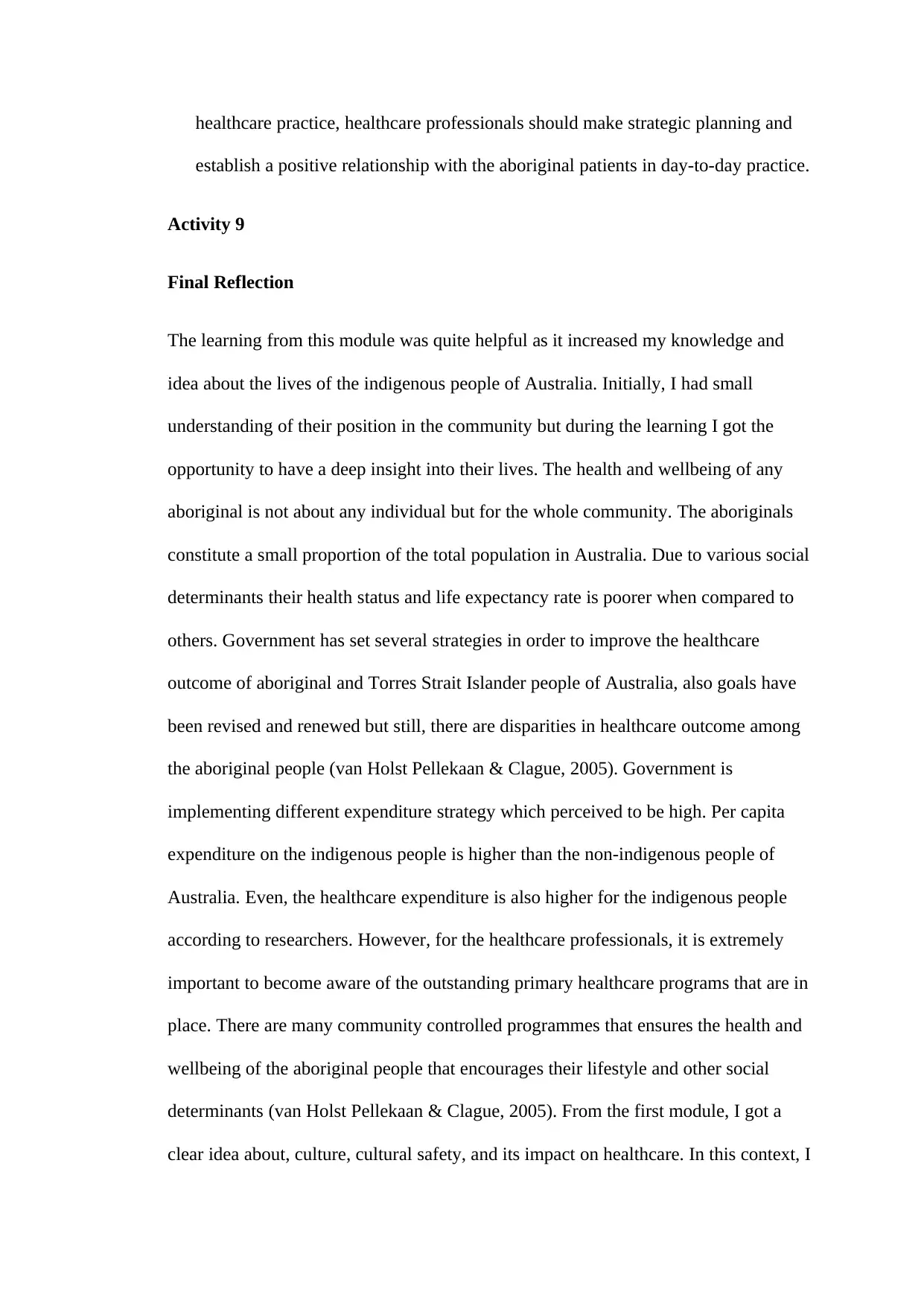
healthcare practice, healthcare professionals should make strategic planning and
establish a positive relationship with the aboriginal patients in day-to-day practice.
Activity 9
Final Reflection
The learning from this module was quite helpful as it increased my knowledge and
idea about the lives of the indigenous people of Australia. Initially, I had small
understanding of their position in the community but during the learning I got the
opportunity to have a deep insight into their lives. The health and wellbeing of any
aboriginal is not about any individual but for the whole community. The aboriginals
constitute a small proportion of the total population in Australia. Due to various social
determinants their health status and life expectancy rate is poorer when compared to
others. Government has set several strategies in order to improve the healthcare
outcome of aboriginal and Torres Strait Islander people of Australia, also goals have
been revised and renewed but still, there are disparities in healthcare outcome among
the aboriginal people (van Holst Pellekaan & Clague, 2005). Government is
implementing different expenditure strategy which perceived to be high. Per capita
expenditure on the indigenous people is higher than the non-indigenous people of
Australia. Even, the healthcare expenditure is also higher for the indigenous people
according to researchers. However, for the healthcare professionals, it is extremely
important to become aware of the outstanding primary healthcare programs that are in
place. There are many community controlled programmes that ensures the health and
wellbeing of the aboriginal people that encourages their lifestyle and other social
determinants (van Holst Pellekaan & Clague, 2005). From the first module, I got a
clear idea about, culture, cultural safety, and its impact on healthcare. In this context, I
establish a positive relationship with the aboriginal patients in day-to-day practice.
Activity 9
Final Reflection
The learning from this module was quite helpful as it increased my knowledge and
idea about the lives of the indigenous people of Australia. Initially, I had small
understanding of their position in the community but during the learning I got the
opportunity to have a deep insight into their lives. The health and wellbeing of any
aboriginal is not about any individual but for the whole community. The aboriginals
constitute a small proportion of the total population in Australia. Due to various social
determinants their health status and life expectancy rate is poorer when compared to
others. Government has set several strategies in order to improve the healthcare
outcome of aboriginal and Torres Strait Islander people of Australia, also goals have
been revised and renewed but still, there are disparities in healthcare outcome among
the aboriginal people (van Holst Pellekaan & Clague, 2005). Government is
implementing different expenditure strategy which perceived to be high. Per capita
expenditure on the indigenous people is higher than the non-indigenous people of
Australia. Even, the healthcare expenditure is also higher for the indigenous people
according to researchers. However, for the healthcare professionals, it is extremely
important to become aware of the outstanding primary healthcare programs that are in
place. There are many community controlled programmes that ensures the health and
wellbeing of the aboriginal people that encourages their lifestyle and other social
determinants (van Holst Pellekaan & Clague, 2005). From the first module, I got a
clear idea about, culture, cultural safety, and its impact on healthcare. In this context, I
Paraphrase This Document
Need a fresh take? Get an instant paraphrase of this document with our AI Paraphraser
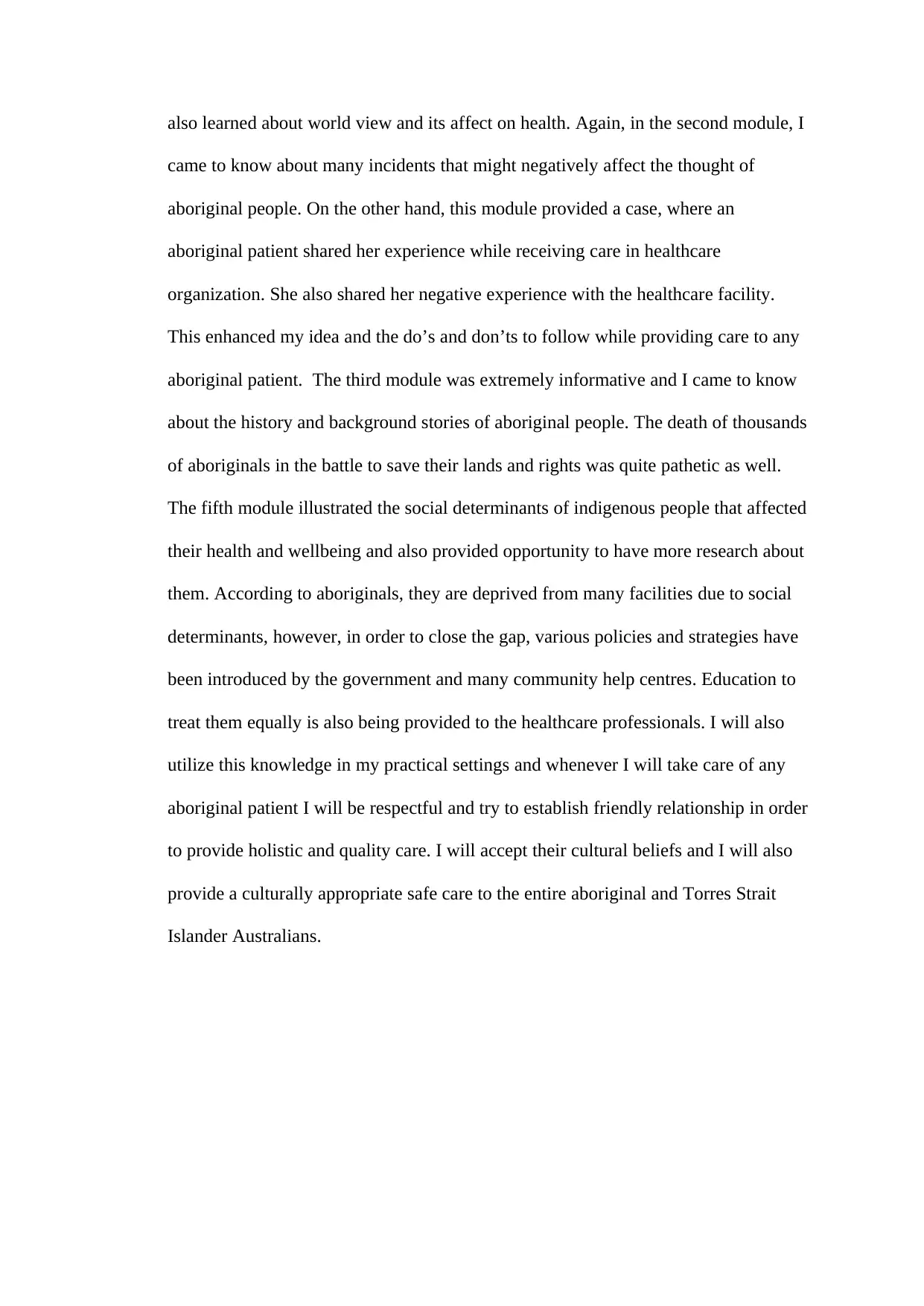
also learned about world view and its affect on health. Again, in the second module, I
came to know about many incidents that might negatively affect the thought of
aboriginal people. On the other hand, this module provided a case, where an
aboriginal patient shared her experience while receiving care in healthcare
organization. She also shared her negative experience with the healthcare facility.
This enhanced my idea and the do’s and don’ts to follow while providing care to any
aboriginal patient. The third module was extremely informative and I came to know
about the history and background stories of aboriginal people. The death of thousands
of aboriginals in the battle to save their lands and rights was quite pathetic as well.
The fifth module illustrated the social determinants of indigenous people that affected
their health and wellbeing and also provided opportunity to have more research about
them. According to aboriginals, they are deprived from many facilities due to social
determinants, however, in order to close the gap, various policies and strategies have
been introduced by the government and many community help centres. Education to
treat them equally is also being provided to the healthcare professionals. I will also
utilize this knowledge in my practical settings and whenever I will take care of any
aboriginal patient I will be respectful and try to establish friendly relationship in order
to provide holistic and quality care. I will accept their cultural beliefs and I will also
provide a culturally appropriate safe care to the entire aboriginal and Torres Strait
Islander Australians.
came to know about many incidents that might negatively affect the thought of
aboriginal people. On the other hand, this module provided a case, where an
aboriginal patient shared her experience while receiving care in healthcare
organization. She also shared her negative experience with the healthcare facility.
This enhanced my idea and the do’s and don’ts to follow while providing care to any
aboriginal patient. The third module was extremely informative and I came to know
about the history and background stories of aboriginal people. The death of thousands
of aboriginals in the battle to save their lands and rights was quite pathetic as well.
The fifth module illustrated the social determinants of indigenous people that affected
their health and wellbeing and also provided opportunity to have more research about
them. According to aboriginals, they are deprived from many facilities due to social
determinants, however, in order to close the gap, various policies and strategies have
been introduced by the government and many community help centres. Education to
treat them equally is also being provided to the healthcare professionals. I will also
utilize this knowledge in my practical settings and whenever I will take care of any
aboriginal patient I will be respectful and try to establish friendly relationship in order
to provide holistic and quality care. I will accept their cultural beliefs and I will also
provide a culturally appropriate safe care to the entire aboriginal and Torres Strait
Islander Australians.
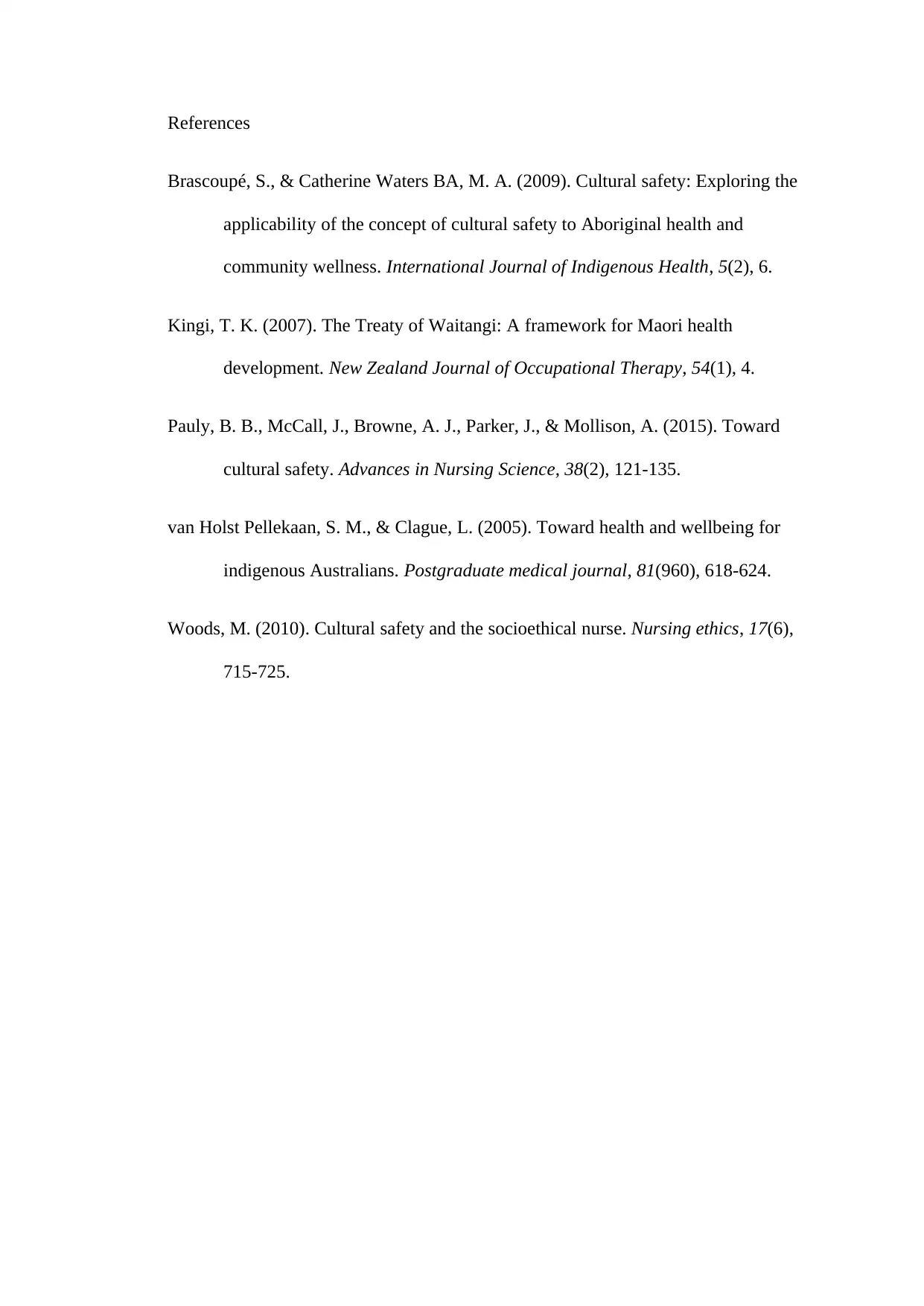
References
Brascoupé, S., & Catherine Waters BA, M. A. (2009). Cultural safety: Exploring the
applicability of the concept of cultural safety to Aboriginal health and
community wellness. International Journal of Indigenous Health, 5(2), 6.
Kingi, T. K. (2007). The Treaty of Waitangi: A framework for Maori health
development. New Zealand Journal of Occupational Therapy, 54(1), 4.
Pauly, B. B., McCall, J., Browne, A. J., Parker, J., & Mollison, A. (2015). Toward
cultural safety. Advances in Nursing Science, 38(2), 121-135.
van Holst Pellekaan, S. M., & Clague, L. (2005). Toward health and wellbeing for
indigenous Australians. Postgraduate medical journal, 81(960), 618-624.
Woods, M. (2010). Cultural safety and the socioethical nurse. Nursing ethics, 17(6),
715-725.
Brascoupé, S., & Catherine Waters BA, M. A. (2009). Cultural safety: Exploring the
applicability of the concept of cultural safety to Aboriginal health and
community wellness. International Journal of Indigenous Health, 5(2), 6.
Kingi, T. K. (2007). The Treaty of Waitangi: A framework for Maori health
development. New Zealand Journal of Occupational Therapy, 54(1), 4.
Pauly, B. B., McCall, J., Browne, A. J., Parker, J., & Mollison, A. (2015). Toward
cultural safety. Advances in Nursing Science, 38(2), 121-135.
van Holst Pellekaan, S. M., & Clague, L. (2005). Toward health and wellbeing for
indigenous Australians. Postgraduate medical journal, 81(960), 618-624.
Woods, M. (2010). Cultural safety and the socioethical nurse. Nursing ethics, 17(6),
715-725.
⊘ This is a preview!⊘
Do you want full access?
Subscribe today to unlock all pages.

Trusted by 1+ million students worldwide
1 out of 6
Related Documents
Your All-in-One AI-Powered Toolkit for Academic Success.
+13062052269
info@desklib.com
Available 24*7 on WhatsApp / Email
![[object Object]](/_next/static/media/star-bottom.7253800d.svg)
Unlock your academic potential
Copyright © 2020–2026 A2Z Services. All Rights Reserved. Developed and managed by ZUCOL.





